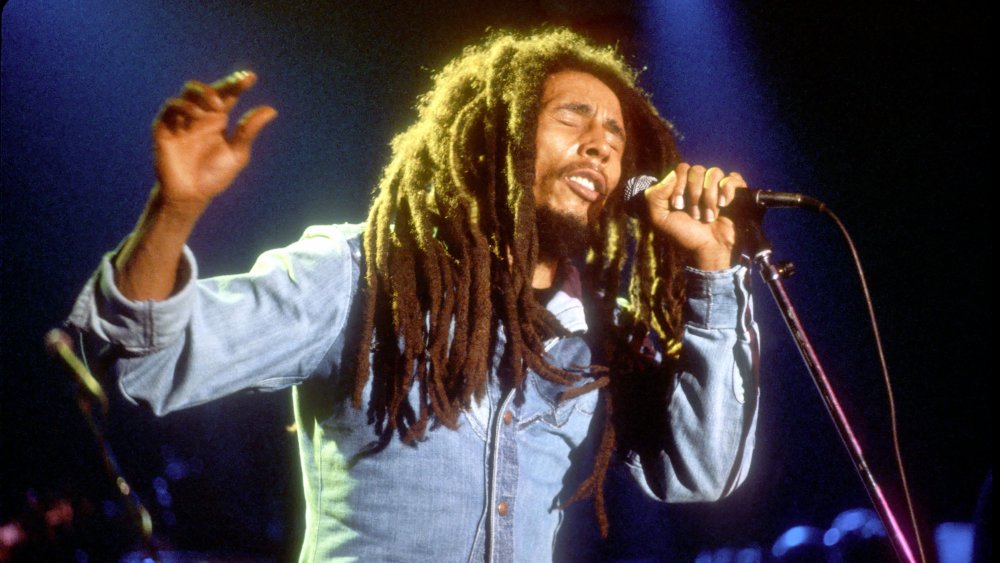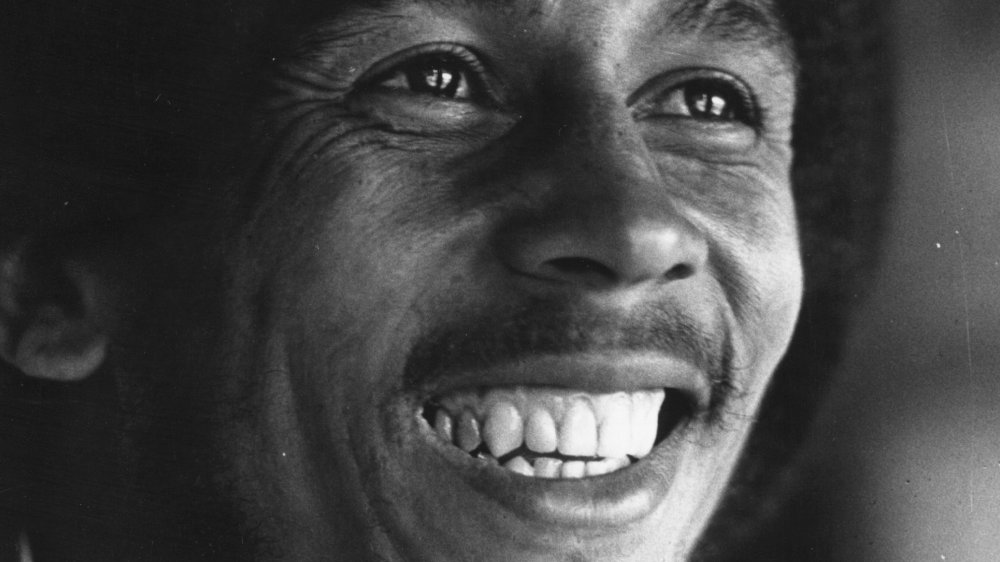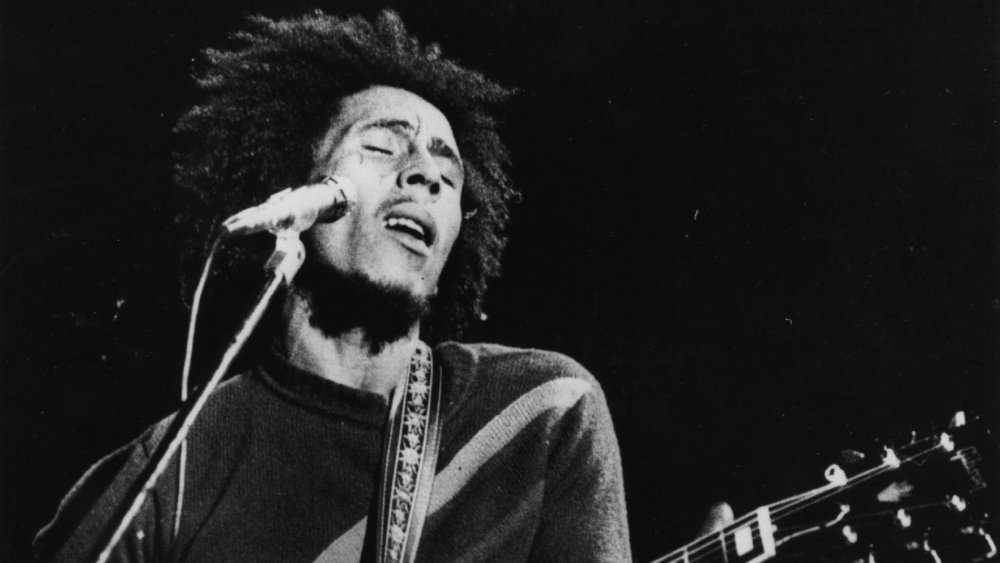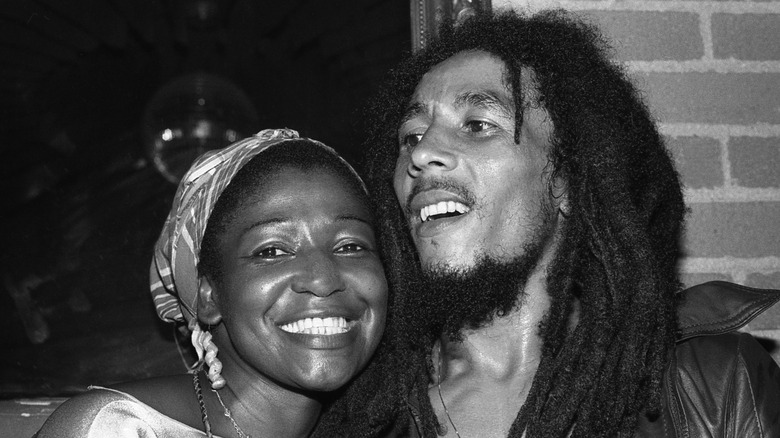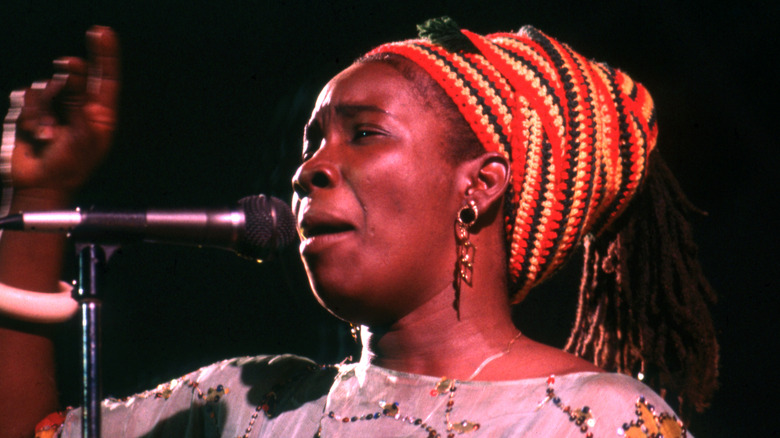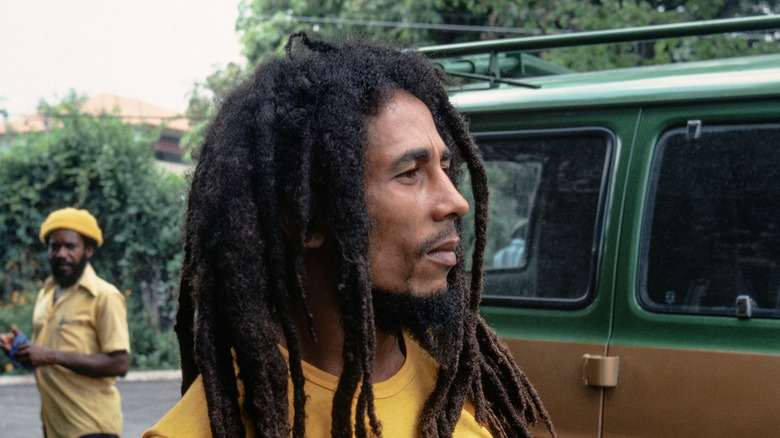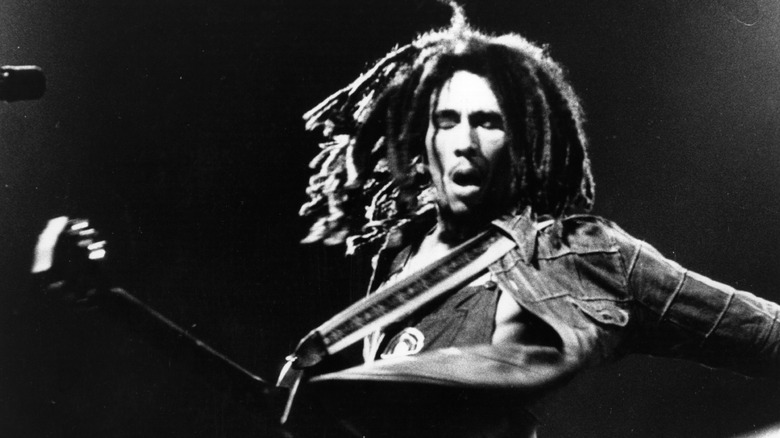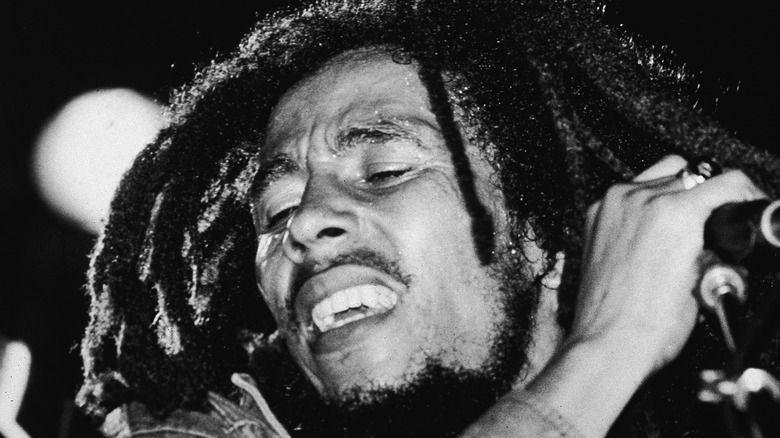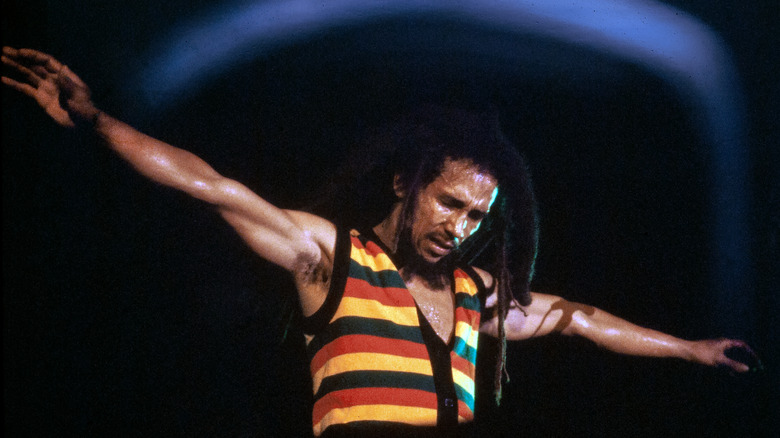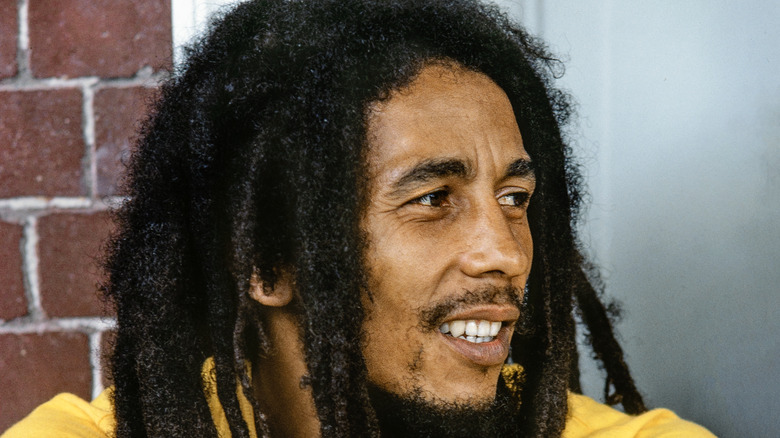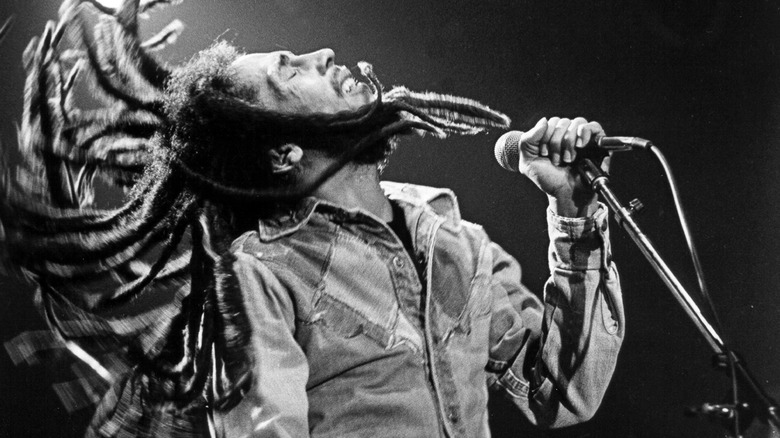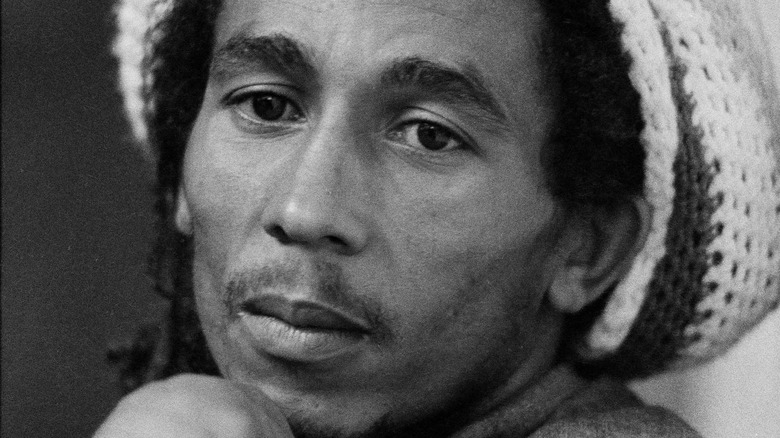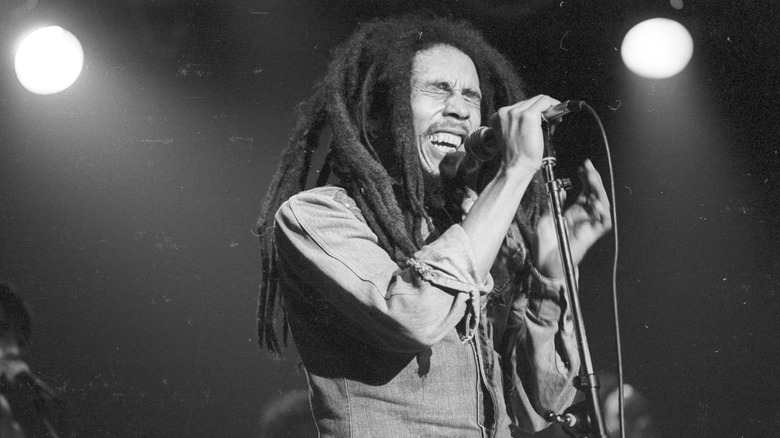What The Last 12 Months Of Bob Marley's Life Were Like
Jamaican music legend and reggae icon Bob Marley, born Robert Nesta Marley, was a force to be reckoned with. His unique, melodious voice and powerful lyrics won him many fans over the years. Not only did he shine a spotlight on Jamaican music, but Bob Marley also introduced the world to important political and human rights issues from his home country. Marley was a lover of Rastafarian culture — a spiritual movement that first arose in Jamaica in the 1930s — and was instrumental in contributing to its popularity. He was not afraid to champion issues he felt strongly about — he sang frequently about social justice and the charged political landscape of his homeland. Marley always seemed to be at home in his skin, appealing to masses across the world in ways few artists had managed to achieve before him.
Bob Marley entered the entertainment industry in 1963 after founding his band Bob Marley and the Wailers. During his nearly two decades in music, Marley released internationally celebrated hits including "Redemption Song," "No Woman No Cry," "Get Up, Stand Up" and "Trench Town Rock." In 1981, Marley tragically passed away at the age of 36 due to melanoma, leaving behind unfulfilled dreams and dedicated fans. Here's a look at Bob Marley's trials and tribulations in the final 12 months of his life, including his fight with cancer, his last album, and his final tour.
He performed at a historic event
On July 3, 1980, Bob Marley was asked to attend a special event: Zimbabwe was celebrating its newfound independence and nationhood with music, pomp, and cheer. Bob Marley and the Wailers traveled for the occasion and performed for an enthusiastic crowd — thousands of happy revelers, including politicians from Africa. To witness Marley and his band performing at that point was an honor for many. The Wailers had become celebrities in their own right.
The occasion was, of course, highly symbolic. Marley, a notable pan-Africanist, was a significant and important figure for Africa. His songs had deep meaning attached to them and were heavy with anti-imperialist, revolutionary themes. Marley had even penned his 1979 song "Zimbabwe" in solidarity with the revolutionaries. According to a piece by Quartz, his music had managed to resonate with Africans all around the world and from different walks of life, acting as a unifier. It's worth adding that Marley happened to be the only non-Zimbabwean musician performing at the venue and paid for his own travels. He performed right after the flag ceremony, and as Quartz notes, some of Zimbabwe's first words as a nation were, "Ladies and Gentleman, Bob Marley and the Wailers!"
Marley knew the Independence Day performance hadn't been accessible for all locals. So, he held a concert again the next day for an audience of 100,000 mostly Black fans.
He was fighting cancer
Bob Marley was taken to doctors in 1977 and diagnosed with skin cancer (or acral lentiginous melanoma, to be exact). According to a piece by NME, Marley's cancer was detected from an unusual location: near one of his toes. He realized something was wrong when he experienced immense pain while playing football that year and realized that pain didn't improve with time. He was forced to seek help.
When doctors found the source of his problems, they told Marley that the best course of action was to amputate his toe to avoid the spread of cancer. He declined the offer and said doing this would be against his religious beliefs. As per Rolling Stone, he simply told his doctors, "Rasta no abide amputation." In Rastafarian culture, removing any part of your body is not accepted. An orthopedic surgeon advised Bob Marley that a skin graft would help rectify his condition, and he believed it, opting to get the graft done and hoping that his troubles were behind him.
He didn't want to think about death
After Bob Marley's cancer diagnosis came to light, his close aides were alarmed. His wife, Rita Marley, urged him to get treatment and not ignore his diagnosis. In her 2004 book "No Woman No Cry: My Life With Bob Marley," Rita Marley wrote about the diagnosis and her husband's reaction to it. As per a piece in Rolling Stone that included excerpts from the book, Bob Marley was overly worried about how he would be perceived while performing. "How could I go onstage?" he told Rita. "They won't stay looking at a crippled man." Rita felt helpless: She was scared about her husband's health but didn't want to interfere with his music and creativity. Those were prime years in his career, and Marley was thriving.
The questions didn't come to a halt. One of Bob Marley's lovers outside of his marriage, Cindy Breakspeare, also rose to the occasion and tried to convince Bob to seek medical help and not ignore his diagnosis. "Do you want me to have cancer?" he shot back at her. Opinions about how the musician chose to deal with his health were divided: While some believed that he was simply following his faith without regard for anything else, others reckoned that Bob Marley didn't want to consciously think about death or acknowledge his fear. He chose instead to follow his passion and continue working on music.
Bob Marley had a complex relationship with his wife
Bob Marley and his wife, Rita, shared a tough bond. The couple got married in 1966 when Bob was just 21. According to GQ, both had been unfaithful several times while being married to each other, and his affairs were mostly with powerful women like former Miss World Cindy Breakspeare and tennis star Anita Belnavis. Additionally, Rita Marley had two children with different men while still being married to the musician. It's believed that Rita Marley was extremely jealous of her husband's extra-marital dalliances. Bob Marley, on the other hand, had at least seven kids with other women, according to Rolling Stone.
When Rita found out about her husband's growing tumor, she didn't want him to continue performing and encouraged him to take a hiatus from touring. While he chose to perform that day anyway, Bob realized he couldn't continue. Finally, he relented to his wife, going to doctors and even trying a controversial treatment in Germany. Rita could have left, but she decided to stay with her husband, despite their issues in the past. She felt protective when it came to Bob and couldn't abandon him.
He was on a mission
With his love for reggae, Bob Marley hoped to speak about the things that mattered to him, like the difficulties that plagued his home country, Jamaica, to audiences across the world. Marley specifically wanted to communicate with audiences he'd previously had no access to and those who didn't know much about Jamaica or Black history. While the musician did manage to have a significant impact, he sadly died before he could fully realize his dream. Bob Marley did come very close to achieving it, though.
As Rolling Stone notes, Marley had pretty much single-handedly gotten reggae attention, pushing it into mainstream culture, and overcoming barriers to make the form shine. Additionally, Bob Marley dove into topics that many wouldn't touch and wrote candidly about Jamaican life. It's worth mentioning that Marley did manage to deliver hits and cover more ground than he could have imagined in his short life: inspiring young listeners for generations to come and selling 20 million records worldwide. The fact that he achieved this in a relatively short period is what perhaps set him apart.
His Uprising was a huge success
Bob Marley's final album, "Uprising," was released 11 months before his death. It had all the necessary ingredients to make it successful: powerful lyrics that resonated with listeners, addictive beats, and politically relevant themes. According to Rolling Stone, Marley's albums, including "Uprising," were commercial successes but not always readily embraced by critics.
One of Bob's children, Cedella Marley, referred to the album many years later in an interview when it was re-released, titled "Uprising Live," and offering insights into her father's musical genius and his desire to take his message to the masses. "'Uprising Live' is the first time I have heard 'Redemption Song' live," Cedella told Billboard. "And, because it was recorded in daddy's later years, there was a certain kind of desperation in his voice, or more like, he wanted to be heard, and it was kind of urgent."
A testament to the fact that the 1980 album was a definite hit was the fact that it received immense appreciation from fans and topped the charts, coming in at 41 (R&B/Hip-Hop Albums) and 45 (Billboard 200). Additionally, the singer was noticed in Jamaica and celebrated — Bob Marley made it to local postage stamps and was honored with Jamaica's Order of Merit. He made it to the big leagues and was often mentioned alongside other notable artists including writers, political revolutionaries, and high-ranking university officials.
Bob Marley's exhaustion was visible
As much as he tried to conceal it and keep his suffering private, Bob Marley's exhaustion didn't go unnoticed. That said, no one was quite sure what was happening to him as he kept his pain under wraps. On June 7, 1980, the iconic singer sang at a party in Crystal Palace in London. The show was noteworthy. Per the Guardian, a local teenager named Rob Baker showed up to the event only to catch a glimpse of a star he'd grown incredibly fond of: Bob Marley.
"For the last song, the sun came out," Baker recalled. "And he came back on stage to play 'Redemption Song' with just an acoustic guitar." He added that this moment was especially memorable for him. However, Marley couldn't completely hide his exhaustion. Music journalist Chris Bohn noticed something was amiss. "I'd seen Bob Marley a few times and his concerts were really something. But there seemed to be a tiredness about his performance that day. Maybe in retrospect it had something to do with his illness," he said. "It's heartbreaking to see the pictures of that day because he doesn't look the same."
He was still touring
Despite his uncertain health status, Bob Marley was intent on doing shows and kept touring in promotion of "Uprising." According to Newsweek, Marley was so devoted to his labor of love that he barely slept and worked hard on his songs for the album. He somehow knew that he had to make every second count and he put his heart and soul into "Uprising," spending as much time as he could on beloved songs like "Pimper's Paradise" and "Redemption Song." Marley's dedication to the Rastafarian culture is apparent throughout each track.
To promote "Uprising," Marley gave it his all, working on a massive tour in Europe as well as in the U.S. Reggae was finally getting noticed because of his work, and he was determined to spread his message far and wide. The first half of the tour was extremely successful and well-received. Marley then began touring the U.S. with enthusiasm. However, his health took a massive toll on his performance. The night of September 23, 1980, would be Marley's last live performance. The tour had to be canceled.
He had security risks to think about while performing
It is important to note that while Bob Marley forged ahead with his touring, he had health and safety concerns on his mind in 1980. As his music touched upon politically charged themes, Bob knew it had the potential to offend those at home and worldwide. According to NYDailyNews, his concerns were serious enough for him to hire security while performing in Madison Garden, New York, in September that year.
His fears weren't unfounded. In 1976, when Bob was set to perform in Kingston, Jamaica, a series of unprecedented events took place. A couple of days before the show, the crew was gathered at Tuff Gong house when they were suddenly attacked by gunmen. The atmosphere in the country was volatile, as elections were underway. Bob Marley was reportedly a supporter of the People's National Party, an idea that didn't sit well with some members of the Jamaican Labor Party.
Rita Marley was shot first. Before anyone could figure out what was happening, the crew found themselves hiding from bullets. The show's publicist, Jeff Walker said, "The firepower these guys apparently brought was immense ... there were bullet holes everywhere." Bob Marley somehow managed to get out of the situation alive but sustained wounds on his chest and arm. His wife was frantically searching for him in her wounded state. While Bob was unsure whether he should go ahead with the upcoming performance, he eventually decided to confront his fears and put on a show anyway.
His last song in public was Redemption Song
Bob Marley played one of his most treasured songs from "Uprising," "Redemption Song," for the last time in 1981. He was in Pittsburgh, exhausted but determined to play for his adoring fans. This would be his final concert before his health issues started dominating his life and made it impossible for the singer to perform. Even though he was tired and suffering, his lyrics were loud and clear as he sang freely.
According to Rolling Stone, this performance was as raw as it could possibly with Bob Marley only playing his acoustic guitar and crooning as his audience listened intently. Marley was sweating onstage and suffering as he sang about freedom. This is the song his fans chose to remember him by when he passed away, playing "Redemption Song" loudly on speakers as the singer's life was celebrated in a state funeral that had thousands of attendees. Bob Marley's fans, weighed down by grief, later shouted, "Hail Him! Praise him" as they remembered the music icon.
His health rapidly declined near the end
Over his final months, Bob Marley's decline was palpable. Unlike in years prior, Marley could no longer deny what was happening. Doctors had considered ways to prolong his life earlier but they were running out of treatments. Despite losing a lot of weight and struggling to stay energetic, Bob Marley believed that he'd make it through tough times. According to the Jamaica Gleaner, the musician was so optimistic after a diet-based treatment in Bavaria, Germany, he said, "Like so many other patients who come here, I was given up by doctors to die. Now I know I can live. I have proved it."
However, Bob's health kept declining and the singer had little respite. He was so tired, he couldn't help exclaiming, "God take me, please" (via Rolling Stone), as he battled pain and tried to put up a brave front. Rita Marley stayed with him, and he sang songs as she watched her husband slowly slip away. She couldn't help tearing up. Noticing this, Marley consoled his wife and said, "Don't cry. Keep singing."
Conspiracy theories floated around after Bob Marley's death
After Bob Marley's death on May 11, 1981, fans around the world struggled to make sense of what happened to a budding star who seemed destined for great things. Conspiracy theories were shared as people refused to believe that he really died of cancer.
Marley was buried in Jamaica but lots of fans weren't convinced about the nature of his passing. A piece in NME highlighted some of the most common theories that took around this time. Many believed that because Marley had a rising prominence as a political figure, the CIA decided to intervene and get him killed. Furthermore, the theory suggested that while an initial attack on Bob Marley didn't pan out as expected, he was given boots that had a radioactive copper wire inside them that gave him cancer. The rumors stayed around for years and there were reports of a former CIA agent admitting that he had killed Marley in 1981. Fact-checking reports later claimed that was a hoax, and the musician had indeed died of cancer.
